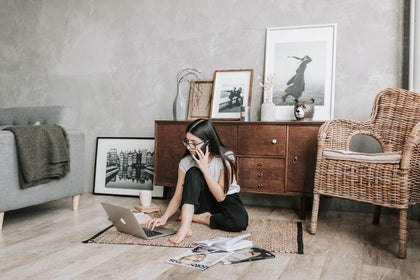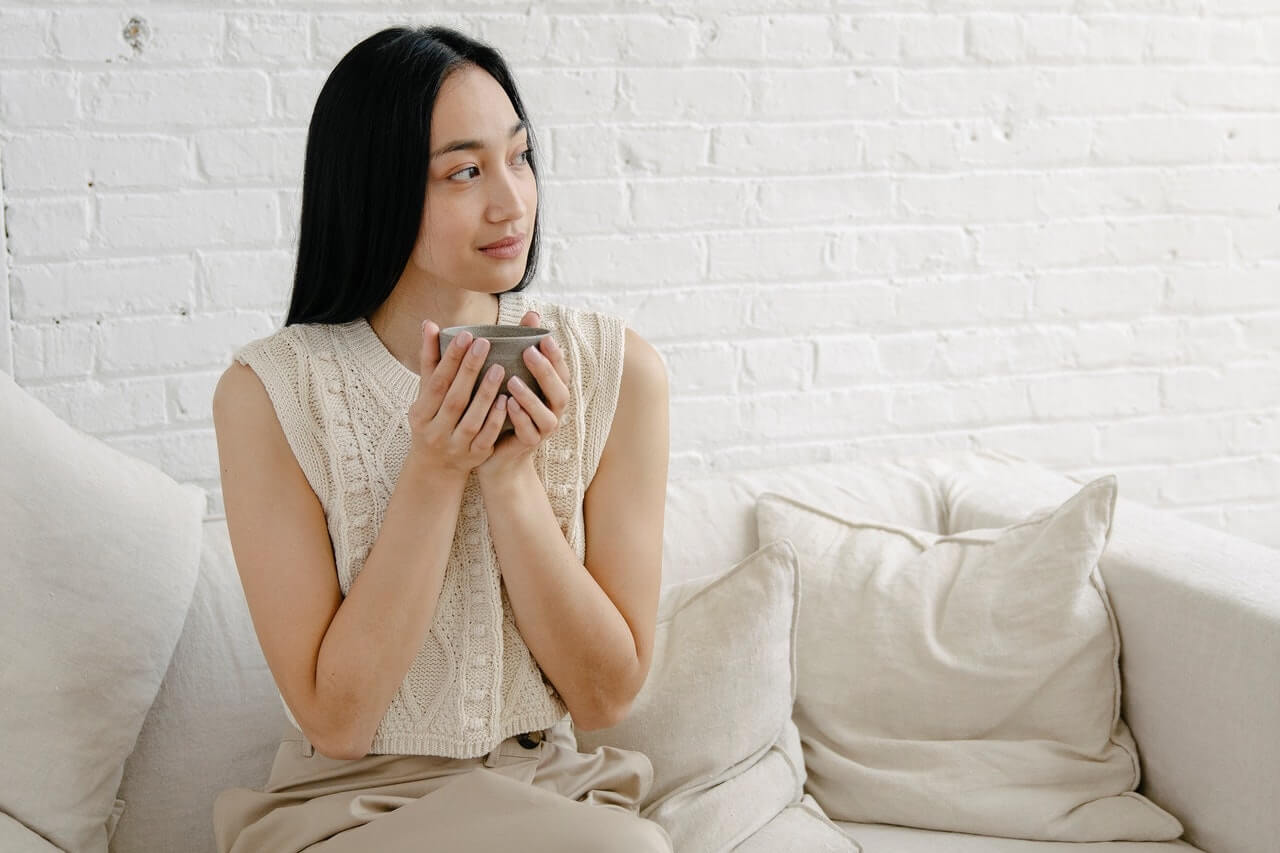Chances are, if you are reading this right now, you’re being exposed to blue light from your computer screen or digital device. Per Nielsen data from July 2018, Americans spend more than 11 hours a day interacting with media, which includes using devices that emit blue light.
While there is already much research to suggest that staring at a digital screen can harm the eyes, newer research is showing how blue light exposure affects your skin. Read on to find out about the impact blue light exposure has on skin and hair health and how to combat it, including what products you can use to help you achieve optimal hair wellness.
What Is Blue Light?
Blue light — also known as high-energy visible light or HEV — is a color in the visible light spectrum that humans can see. Unlike UV light, blue light rays have a shorter wavelength than other types of light on the visible spectrum of light. Due to its shorter wavelength, blue light produces higher amounts of energy. The naked human eye is unable to effectively filter blue light, so more of this type of light passes through to the retina.
According to Harvard Health, not all colors of visible light have the same effect on the brain and body. Blue wavelengths that come from cellphones, tablets and computer screens are beneficial during daylight working hours because they boost mood, attention and alertness. Where they begin to cause trouble is during the later hours of the day when the body needs to begin winding down and moving toward a regenerative sleep phase.
Any type of light can affect a person’s circadian rhythm by suppressing the secretion of melatonin. Blue light, however, affects the circadian rhythm differently than other types of light. Harvard researchers experimented with exposing subjects to both dim green light and blue light while measuring their melatonin levels. Those exposed to blue light had their melatonin levels suppressed by twice as much as the green light group, and their circadian rhythm shifted by twice as much.
Shop: GRO Collection for Thicker, Fuller Looking Hair
Blue Light and the Body
The more research that's done about exposure to blue light, the more there is to learn about the impact of blue light on the skin. While blue light rays are not as harmful as sun exposure (UVA light and UVB light), one study suggests that blue light on skin, even for a short period of time, can cause damage to the skin barrier function as well as free radical damage. The effects of blue light can impact the skin cells before a single YouTube video has ended.
Blue light exposure is not as heavily linked to skin disorders, premature aging, skin aging, photo aging or other skin conditions the same way sun exposure is. And the best defense to protect your skin against more harmful UVA and UVB rays is still to use SPF daily to protect skin. However, continued exposure to blue light affects overall skin health, so minimizing exposure is key.
Learn: How to Protect Your Scalp From the Sun
Blue Light's Connection To Hair Loss
While too much exposure to blue light affects the skin directly, the connection between blue light and hair loss is most often rooted in how blue light affects sleep.
According to Beverly Hills hair restoration specialist Dr. Craig Ziering, visible blue light can cause insomnia, and poor sleep hygiene affects the body’s cellular repair time. Ziering says that insomnia can cause hair loss episodes called telogen effluvium, where the body’s hair growth cycle gets stuck in the resting phase. Ziering also says there is evidence to suggest that too much blue light exposure can accelerate genetic hair loss in both men and women.
UK-based trichologist Kate Holden, on the other hand, suggests that some blue light exposure to hair is harmless, and it’s more about the time of day that you’re exposed to it.
Holden says that blue light suppresses the release of melatonin which causes sleep deprivation. While blue light exposure during the daytime has less of an impact on hair, nighttime exposure is where the problems come into play.
To limit damage from blue light at night, Holden suggests curbing screen time on your digital devices about two to three hours before heading to bed. Night mode settings also help a lot.
How to Reduce the Impact of Blue Light on Hair and Skin
Now that you know about blue light damage and how it can affect the skin and hair, what should you do about it?
Limit Your Exposure
When it comes to blue light protection, limiting screen time on digital devices is one of the best defenses to start with, especially before bed. While scrolling through TikTok videos on your cellphone before turning in for the night is tempting, it’s better to read a book, listen to a podcast or try a personal calming practice like meditation or yoga poses for sleep. Your brain will thank you, and your exposure to blue light damage will be reduced.
Use Products Designed to Block Blue Light
If you must be on your device into the evening, there are products to block blue light, like screen filters for your digital devices. Also, most current devices offer a “night mode” setting that reduces blue light after sundown. Blue light glasses have also been shown to help.
Other Tips for Skin and Hair Health
Protecting yourself from the impacts of blue light is just one way you can improve the health of your hair and skin. Here are some other tips.
Evaluate Your Current Skin and Hair Routine
Healthy skin and hair require a beneficial routine. And when caring for your hair and skin, it's important to use gentle products that are beneficial for hair and skin and free of harsh ingredients like sulfates.
Get Plenty of Quality Sleep
Getting plenty of quality sleep starts with limiting your exposure to blue light. It also helps to go to bed around the same time each night and create a restful environment.
Eat a Nutritious Diet
Whether you know it or not, nutrition impacts your hair and skin. According to clinical nutritionist Erica Zellner, you should up your protein intake to strengthen your hair. She said a good starting point is around 0.7g/lb of body mass. You can also supplement your diet with biotin gummies to help support healthy hair, skin and nails.
Reduce Stress
Did you know that caring for houseplants can help you reduce stress and even sleep better? And there are other good ways to reduce stress, including exercising, taking a walk in a green space and giving yourself a relaxing scalp massage.
Use a Hair Serum
If you feel that blue light exposure may be contributing to your hair loss or if you simply want to encourage thicker, fuller-looking hair, use a plant-based hair serum that's gentle and toxin-free.
A Holistic Approach Is Always the Best Approach
To achieve optimal skin and hair health, it's best to take a holistic approach. In addition to limiting blue light exposure, get plenty of sleep, eat right, exercise, reduce stress and use skin and hair wellness products that are free of harsh ingredients. With this type of approach, you'll be on your way to your best skin and hair yet!
#include-related-slider#
More From VEGAMOUR
- Shop: Sulfate-Free Shampoos
- 12 Foods to Grow Your Healthiest Hair Ever
- Why Am I Losing So Much Hair?



















